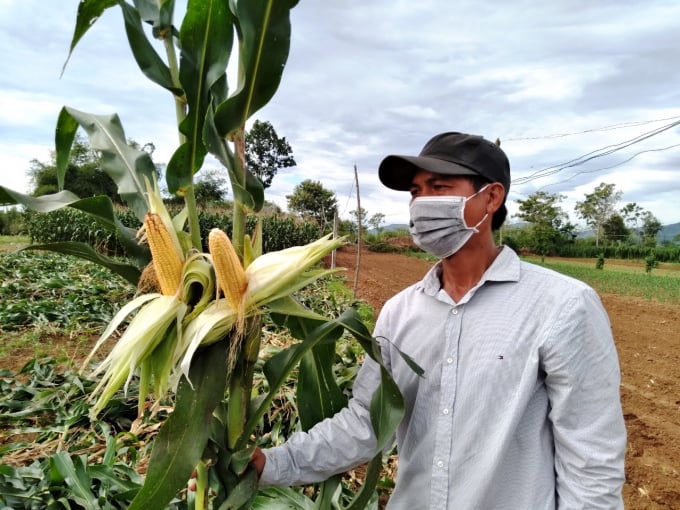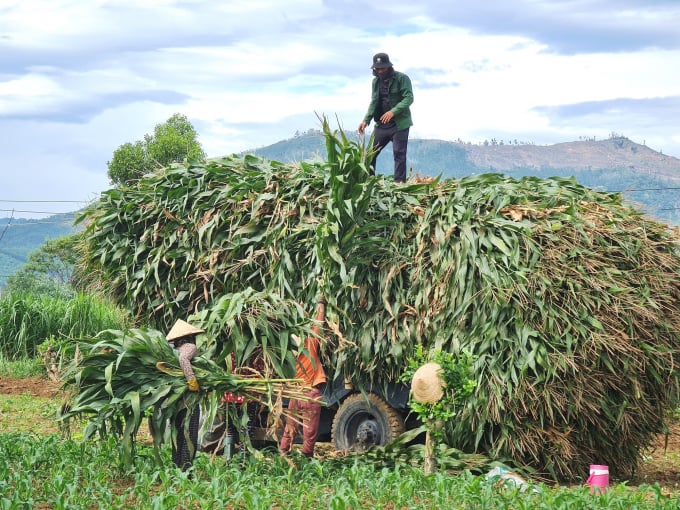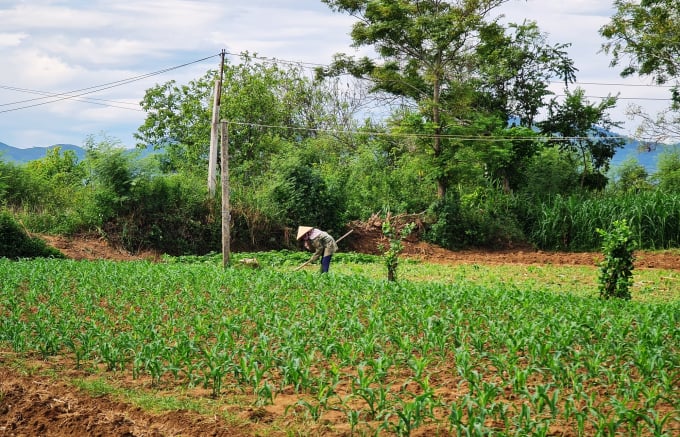November 25, 2025 | 22:51 GMT +7
November 25, 2025 | 22:51 GMT +7
Hotline: 0913.378.918
November 25, 2025 | 22:51 GMT +7
Hotline: 0913.378.918

Biomass corn growing needs less investment and care but brings high profits. Photo: N.D.
In Hanh Phuoc Commune (Nghia Hanh District, Quang Ngai Province), farmers have harvested summer-autumn corn. This is the second crop of Ms. Nguyen Thi Tuyen's family in De An village, Hanh Phuoc Commune who have been growing biomass maize, the variety PAC339, on an area of 1,500m2.
Ms. Tuyen happily said: “Growing biomass corn has many advantages in shortening the time with each crop taking only about 80 days. Farmers do not have to worry about the weather, pests and diseases affecting the yield and quality like growing corn for grain while they can increase the coefficient of land use and improve their income."
In this summer-autumn crop, De An village has about 60 households growing biomass corn on an area of 10.5ha. Most of the households confirmed that growing biomass corn significantly reduced labour and costs. In particular, as the harvested corn is a fresh product (at the stage when the corn is ripe), farmers do not have to pay extra costs for seed separation, drying and storage.
Ms. Vo Thi Thu Nhi from De An village, Hanh Phuoc Commune said that during the previous crop of biomass maize, she and local households applied used very little fertilizer, and the labor cost was not much but corn plants still grew well with high yield and profit.

In the summer-autumn crop of 2021, biomass corn growers in Quang Ngai Province are very happy as they have got a good harvest and price. Photo: L.K.
“My family has just harvested 3,000m2 of corn biomass. For every 1 sao (500 m2), we can get an average of 2.5 tons of maize and with the selling price of 1.3 million VND/ton, we can earn nearly VND3.3 million/sao. In the previous crops, when I planted normal corn on 1sao, I could only collected 300kg of dry grain corn and with the selling price of VND7,000/kg, we could earn only VND2.1 million. Growing corn for seeds like before took a longer time to harvest and we could produce only two crops per year,” said Nhi.
In the summer-autumn crop of 2021, the whole Nghia Hanh District has 250ha of biomass corn with an average yield of 50-60 tons/ha. Each year, with three crops, farmers can earn a profit of nearly VND90 million/ha/year. Thus, planting biomass corn can be considered as one of the good solutions to undertake the agricultural conversion on inefficient farming areas.
Mr. Vo Thanh Quy, Chairman of the Farmers' Association of Cho Chua town (Nghia Hanh District) said growing biomass corn had advantages of more benefits and faster harvest. For growing corn to get seeds, it is necessary to separate the seeds and dry them after harvest, but for biomass corn, it is not. Especially in this crop, farmers who have a large area of normal corn will face difficulties in drying the corn seeds after harvesting if the weather is with rains. Therefore, biomass corn is a good direction for efficiency and higher economic value.

The shortening of production time in biomass maize growing will help farmers increase one or two more crops per year. Photo: N.D.
Quang Ngai Province has only developed 350ha of biomass maize. It is expected to increase the growing areas to 500ha by 2022 and 600ha in 2023, and stabilize a large raw material area. At present, the districts of Mo Duc, Nghia Hanh, Ba To, Duc Pho, Tu Nghia are the localities with a large area of biomass maize growing in the province. In some places, the yield is very high, reaching from 60-64 tons/ha.
Ngo Huu Phuoc, Head of the Supplying Board of Vinamilk Quang Ngai Dairy Farm, said: “According to the 2021 plan, this unit will purchase 15,000 tons of biomass corn, of which, since the beginning of the year, 5,500 tons have been purchased. This is a new direction to help farmers stabilize their income.”
The method of growing maize biomass will help shorten the cropping time. As a result, farmers can not only increase 1-2 crops a year, reduce risks due to weather conditions and natural disasters, but also increase income and especially significantly reduce the amount of fertilizer. Due to the time when corn plants from waxy to fully ripe, it is a period of using a lot of nutrients thus depleting nutrients in the soil.
The conversion to growing biomass corn as raw materials for animal feed processing has opened up new production directions for farmers in Quang Ngai Province, contributing to improving their income, helping them no longer worry about “good harvest or price decrease” like that happened in previous years.
Translated by Mai Phuong
/2025/11/24/3536-2-112800_176.jpg)
(VAN) Dong Nai now has tens of thousands of hectares of forests certified for sustainable management, and this area will continue to be expanded in the coming period.

(VAN) Vinh Ha hamlet (Dai Xuyen commune, Hanoi) is shifting away from small-scale farming as households adopt bioscurity into their breeder chicken models.

(VAN) Heavy rains make aquatic species more vulnerable to disease. Proactive water management and high-tech systems help farmers prevent outbreaks and protect yields.

(VAN) Greenhouses are shifting production mindsets in Binh Lu commune, enabling farmers to ‘weather the sun and rain’ and secure stable vegetable harvests throughout the year.

(VAN) Green transition is crucial for the Mekong Delta amid climate change and stricter standards, offering a path toward sustainability.

(VAN) Dong Thap promotes agricultural restructuring, forms large specialized farming zones, raises the value of agricultural products and develops toward ecological and high-tech directions.
/2025/11/22/4018-4-213342_747.jpg)
(VAN) The Mekong Delta Agricultural Experts Club has attracted 143 experts and researchers to participate in providing consultancy and contributing initiatives to the development of one million hectares of high-quality rice.